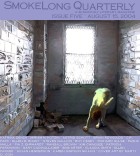The beautiful scenesters line the street to the theater. Oh, says the girl—she laughs and says, It smells. It’s the truth, jackets pulled from grandma’s old steamer trunk, librarian skirts from the Village Thrift, Chucks that haven’t been off their owners’ feet for years except maybe for a weekly shower.
They match the theater, that is something special, a smell flowing from them and into the street. People drive by, slipping from one grotto of light to the next, staring. When they are allowed in the theater, in a minute, it will all match. This is an old place, an old nickelodeon, and the ragged seat cushions haven’t been changed or cleaned since the 1920s. The milky lamps set along the walls let off an even vaguer light than planned because of the dust lying thick in their bowls.
The theater owner stands by the box office, tweed jacket, checking his watch, and finally he says, Okay, come on, and the beautiful scenesters begin to push their way inside.
Oh wow, says the girl once they’re inside, standing by the concessions stand. An old popcorn popper stands on the counter, a glass square with a wooden yellow top that says, “POP-POP-POPCORN!” in red letters. The carpet has long runs, they match her stockings and she notices this and laughs before realizing that she shouldn’t.
The theater’s sound system dates to the 1980s and crackles during the show, sometimes blanking out entirely so the scenesters have to fill in the words. When lyrics appear on the screen, black dots dancing above them, they sing along. They fill the theater with noise and laughs and smell but then the show is over and the lights come back on and the seats that have been stripped of soft seat and back cushions flood back. The girl cracks her knuckles and checks her watch, and for a few minutes everyone rustles, pulling more candy from purses and pockets, and talking, Wasn’t that fucking awesome—well yes, yes it was.
The owner trots up the left aisle and climbs atop the stage where he waves his hands for silence. They will be out in just a moment! he says, smiling. Spreading his hands wide and looking at them all.
The girl cracks her neck. She looks up at the ceiling, the floor of the empty balcony. At one time there was an elaborate plaster design there, but it has begun to crack and chip. She imagines the whole thing shaking, all the plaster raining on their heads and turning them ghostly, and maybe there will be something better hidden up there.
Up on the stage the owner leads the munchkins to the center. He sets them on the stage with microphones and smiles, isn’t he happy, and backs off into the curtains. The beautiful scenesters begin to throw questions at the man and the woman—-what have you done since Oz, what was Judy Garland like, her voice?
The girl stands and walks up the aisle. She cannot see the two clearly. The woman has made herself up carefully, brown hair set in tight ringlets, glaring red lips, smooth stretches of stocking. The girl bends down and unties her high tops, setting them under a seat with her socks and stockings. She stretches her toes out like a frog.
When she is standing at the stage, her belly button hitting the wood, she stops. The woman talks about the dance she did and does an imitation. The man watches the girl.
The beautiful scenesters shout out their questions. Greasy hair and ripped black jeans and excitement, fingers drumming their knees as they wait their turn. The girl stretches her toes again. She holds her hand out to the man and he moves, slowly, into her grasp. Wrinkles are cut into his face, so deep as if he is just a block of wood and maybe he is, but she has seen him when he was young, just an hour ago, so—
He leaves his cane on the stage. She helps him down and together they walk up the aisle to the street, her feet bare and cool and waiting for the evening air.


 The core workshop of SmokeLong Fitness is all in writing, so you can take part from anywhere at anytime. We are excited about creating a supportive, consistent and structured environment for flash writers to work on their craft in a community. We are thrilled and proud to say that our workshop participants have won, placed, or been listed in every major flash competition. Community works.
The core workshop of SmokeLong Fitness is all in writing, so you can take part from anywhere at anytime. We are excited about creating a supportive, consistent and structured environment for flash writers to work on their craft in a community. We are thrilled and proud to say that our workshop participants have won, placed, or been listed in every major flash competition. Community works.